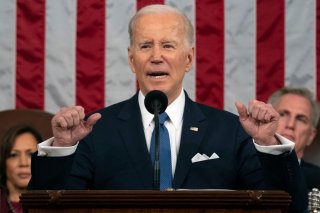How Biden’s State of the Union Got China Right
The downplaying of the PRC balloon flap seems to be a measured approach as Xi’s China is revealing signs of growing domestic instability and policy irrationality.
Delivered just three days after a U.S. fighter jet shot down a high-altitude reconnaissance balloon from the People’s Republic of China (PRC), President Joe Biden’s State of the Union Address sounded incredibly benign toward Beijing. To be sure, the president repeated the consistent themes of “competing with China” and “autocracies have grown weaker, not stronger.” Even at one point, he shouted out “name me a world leader who would change places with Xi Jinping, name me one!” But, he also reaffirmed that he wanted “no conflict,” and stated that “I am committed to work with China where it can advance American interests and benefit the world.” The president neither explicitly mentioned the balloon nor the U.S. military response. Instead, Biden ambiguously said, “[M]ake no mistake: as we made clear last week, if China threatens our sovereignty, we will act to protect our country. And we did.” On a separate occasion, Biden told reporters that taking down the PRC spy vessel would not “weaken” U.S.-Chinese relations. “We’ve made it clear to China what we’re going to do. They understand our position. We’re not going to back off. We did the right thing. And there’s not a question of weakening or strengthening; it’s just the reality.”
Is this an about-face on U.S. China policy? Hardly. Biden has not retreated from the key U.S.-Chinese battleground—securing cutting-edge technology and semiconductor supply chains. Building on the CHIPS Act passed last August to promote U.S.-based semiconductor production, free from Chinese interference, Biden asserted, “We're going to make sure the supply chain for America begins in America … I will make no apologies that we are investing to make America strong. Investing in American innovation, in industries that will define the future, and that China’s government is intent on dominating.”
The downplaying of the PRC balloon flap seems to be a measured approach as Xi’s China is revealing signs of growing domestic instability and policy irrationality. As David Sanger observed in the New York Times, The Biden administration is debating which China will be harder to handle: “a confident, rising power or the one that, in recent months, seems to be stumbling, unable to manage the Covid-19 virus, and increasingly stressed as it tries to restore the spectacular economic growth that was the key to its power.” Apparently, an opaque authoritarian regime, marked by the lack of transparency and free policy deliberations, is always prone to reckless and nationalistic overseas undertakings. As Xi transforms the Chinese political system from the post-Mao collective leadership into a personalist or strongman regime, the echo-chamber effect may generate even more audacious, though aimless, foreign policy ventures that could easily escalate tensions into greater confrontations.
Beijing’s motivation to fly a spy balloon to the United States, in such a presumptuous manner and on the eve of a crucial high-level official meeting aimed to steady U.S.-PRC relations, requires serious investigation. The Biden administration reproached the Chinese government for grossly violating America’s national sovereignty, prompting a last-minute cancellation of a trip to Beijing on February 3 by Secretary of State Antony Blinken—the highest-ranking U.S. official to visit China since 2018. Blinken’s trip was meant to follow up on Biden’s meeting with Xi at the G-20 last November as part of an effort to put a floor under the increasingly contentious relations between the United States and PRC. Did Xi intentionally approve the mission to test U.S. resolve despite the potential risks of being discovered and derailing Blinken’s trip? Or was it internal mismanagement and a deficiency of coordination and communication between the civilian and military bureaucracies? The notion is that the right hand does not know what the left hand is doing. Biden officials believed that “both the senior leadership of the People’s Liberation Army and Chinese Communist Party, including Xi, were also unaware of the balloon mission over the United States, and that China is still trying to figure out how this happened.” Alternatively, if Xi was apprised of the balloon launch and approved its mission, he might have underestimated the strong domestic reactions within U.S. politics.
The intransigent attitude and poor handling by the Chinese government in its aftermath suggested the capriciousness of an autocrat that has grown drunk on his concentrated power, propaganda, and self-fulfilling narratives. It may be prudent for Biden to refrain from overly hyping up tensions with Beijing and avoid pushing a beleaguered Xi to the corner until more information and facts are received and assessed. However, Washington must be more vigilantly prepared to step up its guard in countering not only an aggressive PRC but, worse, an erratic one.
Dean P. Chen, Ph.D., Associate Professor of Political Science at Ramapo College of New Jersey.
Image: Midary / Shutterstock.com

